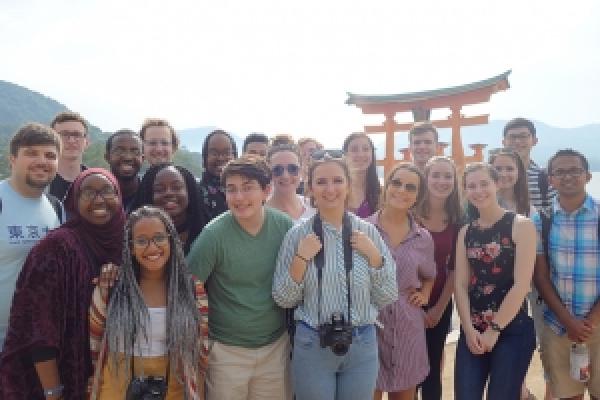December 3, 2018
Professor Motomu Ibaraki's study abroad course featured in ASC news article

The College of Arts and Sciences has published a news article about Professor Motomu Ibaraki's annual study abroad course to Japan. Read the piece below.
Earth sciences and public health merge in study abroad course to Japan
Motomu Ibakari, associate professor of Earth sciences and environmental health, arrived in Tokyo around 2:45 p.m. local time on March 11, 2011.
Minutes later, a magnitude 9.1 earthquake off Japan’s east coast shook the country and sent a devastating tsunami that caused nuclear meltdowns at the Fukushima Daiichi Nuclear Power Plant. Overall, the natural disaster caused 15,896 deaths and approximately $360 billion in damages.
“My understanding of disasters changed a lot that day,” said Ibaraki, who had to stay in the airport overnight and was briefly stuck in Tokyo as a result of the earthquake. “Everything changed from that one accident — that one earthquake.”
A year later, Ibaraki traveled to Fukushima and Iwate to see how the tsunami’s impact continued to affect the region. Upon realizing how one major incident changed the course of so many lives, Ibaraki decided to fuse the disciplines of public health and Earth sciences into one study abroad course, titled "Field Experience in Global Public Health: Japan."
“It’s a good experience for students to see how the environment affects human health,” Ibaraki said. “It’s a real, interdisciplinary example of combining Earth sciences and public human health aspects together.”
The study abroad course is offered through the public health specialization in environmental public health. The interdisciplinary program combines courses from the College of Public Health and the College of Arts and Sciences and applies principles of math, chemistry and biology to the science of environmental public health. The course begins its sixth year May 2019, and the deadline to apply is Jan. 3, 2019.
From mid-to-late May, Ibaraki leads between 15 to 20 students through locales such as Tokyo, Hiroshima and Fukushima, where they study a wide range of public health, sociological and cultural issues through a Japanese perspective. Students have opportunities to observe the impacts of the Fukushima nuclear disaster, reflect on the impact of the atomic bombing of Hiroshima and listen to first-hand accounts from individuals affected by mercury pollution in Minamata.
A group of students stand before the Hiroshima Peace Memorial, a building that withstood the atomic bombing of Hiroshima and is now preserved as a memorial the tens of thousands who lost their lives in the attack.
“Students actually see and smell and feel the sights,” Ibaraki said. “Seeing a storyteller and listening to what they say is very, very strong compared to when I go downstairs and give lectures.”
Niki Asa is a junior majoring in environmental public health who went to Japan for the study abroad course last May. One experience that stood out to her was visiting the Fukushima site. A bus took students through desolate neighborhoods before driving past the power plant itself, giving observers the chance to see the scope of the damage and the effects it had on the surrounding areas.
“That was an experience I never really thought I’d ever have,” Asa said. “They said they’ve done a really good job containing [the radiation], and they want people to come and look at what they did, what worked for them and what didn’t work for them. It’s a learning experience.”
Students inside a bus observe the wreckage at the Fukushima Daiichi Nuclear Power Plant.
Ibaraki encourages students interested in environmental issues to consider the study abroad trip. He says that while it’s important for students to learn about environmental issues, sometimes how they affect people is glossed over.
“We have to understand not only environmental issues, but also human health aspects."
